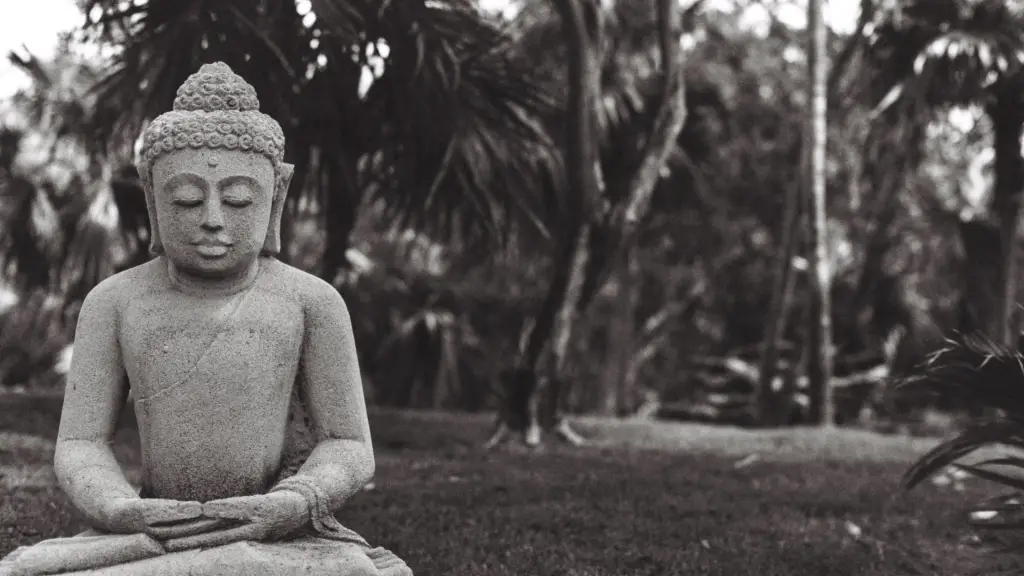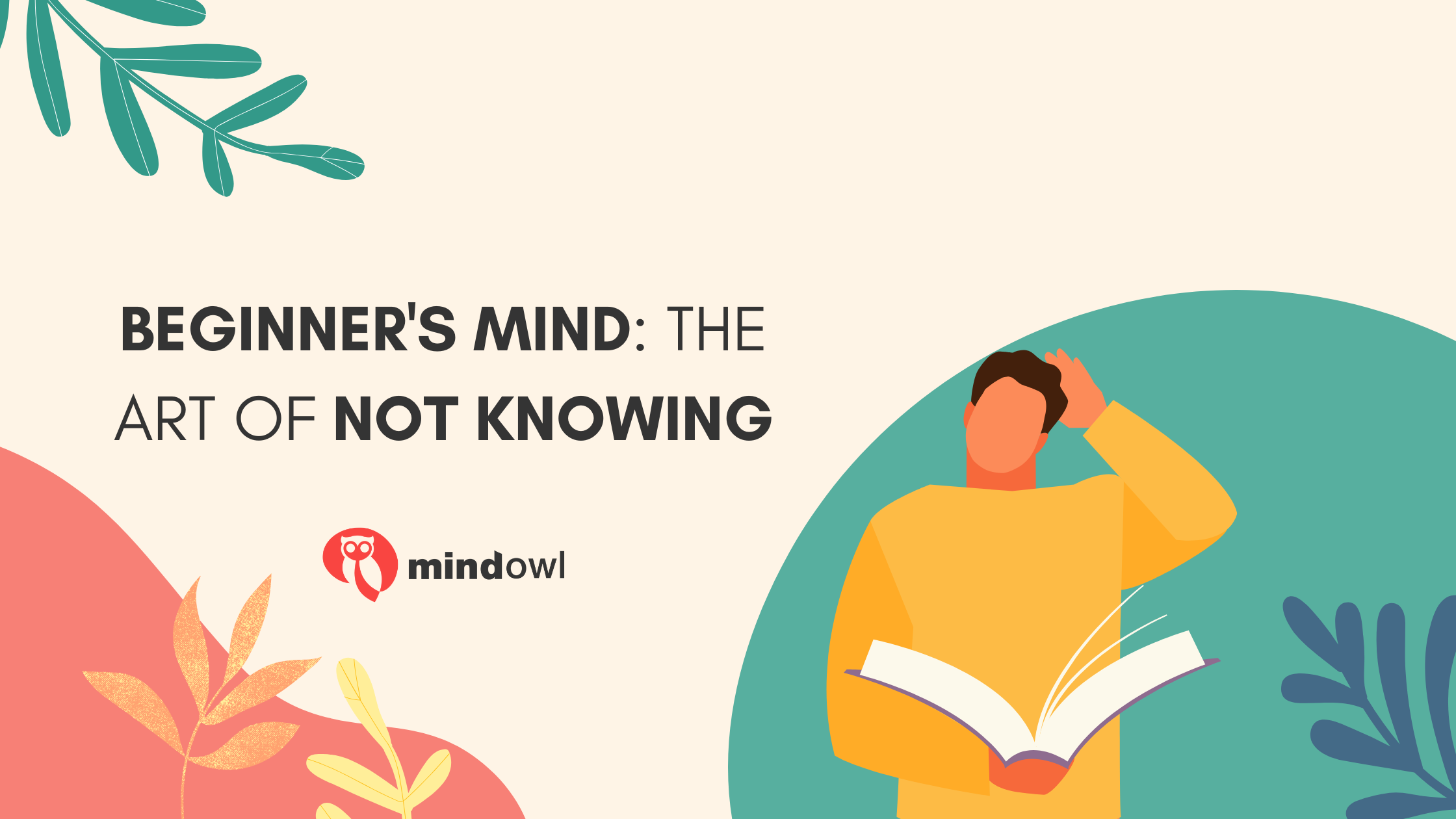What is Beginner’s Mind?
Originating from Japanese Zen Buddhism, the term ‘Beginner’s Mind‘ (or ‘shoshin’) refers to a paradox: the more you know about a topic, the more likely you are to close your mind to further learning.
In the book, ‘Zen Mind, Beginner’s Mind’, Shunryu Suzuki summarises this principle with the line ‘In the beginner’s mind there are many possibilities, but in the expert’s there are few’. This idea is founded upon a kind of open-mindedness that can allow us to learn new skills, make better decisions, and be more empathetic.
Developing a Beginner’s Mind is all about freeing ourselves from any preconceived expectations about what should happen next, and by doing so reducing the risk of stress or disappointment. This relates strongly to meditation, which relies upon us approaching each session with complete openness, avoiding expectations or preconceptions. A pillar of this is observing whatever arises in consciousness without judgement or comment, and instead endeavouring to simply let it go.
These principles of Beginner’s Mind can be implemented naturally outside the world of meditation. By being more open, receptive, and curious in our daily lives, we can unlock deeper creativity, flexibility, and resilience to challenges.

The characteristics of a Beginner’s Mind
Openness
This involves being open to seeing different perspectives and experiencing new things. An attitude of openness means resisting any urge to dismiss other people’s opinions or close off our minds and agree. By removing prejudgements and preconceptions, we can have better experiences, because we reduce the risk of disappointment or frustration.
Flexibility
By channelling the willingness to learn that defines children’s minds, we can increase our ability to adjust to changing circumstances. A Beginner’s Mind is always ready to adapt to unexpected events and situations.
Curiosity
A curious mindset when exploring unknown territory can help prevent boredom, frustration or confusion when learning new skills. Curiosity encourages us to explore new subjects, ask questions, and seek answers. Having a curious mind means digging a little deeper into how things really work, and trying to understand why certain phenomena occur. A curious person wants to expand their horizons by finding out all they can about any topic that interests them.
Acceptance
Acknowledging and accepting people’s differences is crucial to developing a beginner’s perspective. If we attempt to accept and understand opinions that are different from our own, we also reduce feelings of frustration, anger or confusion towards others. When you have a beginner’s mind, you’re not attached to any preconceived notions or opinions. You don’t judge things as good or bad; instead, you see them simply as they are. This allows you to accept other people and encounter current life circumstances without judgment. You don’t spend time fighting against things, rather you focus on what is within your control.
How our psychology can hold us back
Confirmation bias
One of the biggest obstacles in the way of developing a Beginner’s Mind is confirmation bias. This means our tendency to seek evidence that supports rather than contradicts our existing views. When our beliefs influence which information we choose to believe and why, we are prone to ignoring facts that contradict our opinions. Thus, we are less likely to make well-informed decisions.
Humans are incredibly susceptible to confirmation bias, because our brains are wired to pay attention to certain kinds of stimuli while ignoring others. However, if we root out these biases, we can teach ourselves to ignore them.
To combat confirmation bias, when you have an “expert mind” you actually need to pay more attention, not less. By closely noting our thought processes and asking questions like ‘How did I come to this conclusion?’, ‘Can I prove this belief?’, ‘Do I fully understand this issue?’, or ‘What if I am wrong?’, we can take control of our critical thinking and prevent our brains from making decisions for us.
The curse of knowledge
By the time we reach adulthood, our brains have been ‘hard-wired’ for certain ways of thinking, due to years of knowledge-building experience. While this can be useful in growing levels of expertise in certain subjects, it also means we may struggle to look outside of our own headspaces when approaching problems.
Specifically, there are two common traps we can fall into:
The Expert Trap
It can be easy to fall into the trap of thinking we know it all. The problem with this mindset is that we get stuck inside our own heads, trying to find answers internally instead of reaching out to people who could help solve our problems. Buddhist teachings propose that our knowledge of the world is actually very limited. If we value our ‘Don’t know’ mind and act like a true beginner, our opportunities for learning increase.
The Problem Solver Trap
Humans are programmed to solve problems. Unfortunately, this can sometimes work against us. When faced with an issue we can go straight into a problem-solving mindset without taking the time to fully understand what is present in front of us. Looking for solutions in this way can prevent us from realising that maybe this supposed problem doesn’t need to be fixed at all, only put into a different perspective.
Why should we cultivate a Beginner’s Mind?
Okay, so how does thinking with a Beginner’s Mind help us? Here are some useful benefits of this mindset:
Develop different approaches to problem solving
Noticing our own thinking patterns takes practice. Usually, our thoughts and responses to things are so natural and impulsive that we are blind to them. However, if we approach situations with no assumptions, we might notice things that other people miss entirely. Considering different perspectives can enhance our ability to solve problems, both for ourselves and others.
Improve your relationships
Beginner’s Mind can help us generate better relationships, in which we try to notice people’s good intentions, and don’t necessarily hold them up to unrealistic ideals. If we drop expectations and assumptions when interacting with others, our listening and interpreting improve. In fact, one of the greatest gifts we can give another person is simply to be present with them — to stop trying to figure out what they “really” want to talk about, and instead just allow them to tell us what they really need to share. It’s like a breath of fresh air for both parties. It also helps us become more compassionate. When we are open to new possibilities, we are less likely to be judgmental of others, and more likely to see their point of view.
Increase your efficiency
A Beginner’s Mind can reduce procrastination by providing fresh perspectives on tasks and activities. An open mind gives you the space to explore new possibilities, learn new things, and break out beyond your comfort zone; thinking about things in multiple ways can increase your ability to work efficiently. Live more in the present
A beginner’s mind also helps you to become more present-focused. Since we are not going back to the past to look at how we acted in a similar situation or going to the future to imagine potential outcomes, we can be fully present at each moment. As a result, it becomes easier to enjoy life in the here and now.
Why do adults lose the Beginner’s Mind?
Often, adults learn so much that they lose the ability to unlearn, becoming poor at questioning things correctly. On the other hand, children are tuned to learn, which gives them some amazing advantages over adults. While children are designed to explore, to learn, to change, adults are designed to exploit, find resources, and make things happen. Adults have the capacity to learn, but children are in a constant state of extracting as much information from the world as possible. As a result, they are great at generalizing, adapting to challenges, and developing resilience.
How can we learn from 2-year-olds? Well, kids have different mechanisms for experience. They get frustrated less easily or by different things, they find joy in experiences, locations and sensations that we take for granted. Beginner’s Mind means rediscovering these ways of thinking and growing as a result.
How to rediscover your Beginner’s Mind
Cultivating a Beginner’s Mind takes time and effort because it means chipping away at the behaviours you’ve learnt as an adult. Here are some different approaches you can take towards rediscovering this mindstate.
Meditation practice
The most common route towards developing a Beginner’s Mind is through traditional meditation practices such as Vipassana, Zen Buddhism, Tibetan Buddhist Meditation or Secular Mindfulness. Anchored in the present moment rather than in past memories and future worries, these practices encourage us to look internally and learn to recognise negative or judgemental patterns of thought and emotion. This can help us note our typical triggers and automatic reactions, which cause us to react negatively to events without fully realising why we feel angry, sad, or scared. By gaining insight into these internal processes, we can learn to respond differently.
Practise the ‘Don’t Know’ Mindset
Sometimes, the best thing you can do is say “I don’t know”. When we get used to admitting that we’re unsure about things, we increase our ability to handle uncertainty. Ultimately, if you truly believe you know how to solve a problem, you’ll likely attempt to force your solution without considering other options. This Jack Kornfield meditation encourages practitioners to think about all the things in the world that they’re unsure about. This can really help us gain some perspective.
Let go of the need to add value
Many people possess an overwhelming need to add value to those around them. This can actually hinder progress by preventing you from listening to others. Channel your energy into observing and listening, and let go of the need to always contribute.
Release yourself from the narrative in your mind
Reflect on your own thoughts and feelings, and consider the narrative your mind is creating around the events that are taking place. Is it getting carried away? By attempting to focus on the bare events rather than the stories your mind is creating around them, you can take a significant step towards developing a Beginner’s Mind.
Incorporate Beginner’s Mind into daily activities like eating breakfast
Try to approach daily activities like eating breakfast with a fresh mind. Look closely at details you may not always notice. Pay close attention to the textures, tastes and smells of the meal, appreciating every bite and taking nothing for granted. This kind of mindful approach to everyday tasks is all about rejecting preconceptions and assumptions.
Let go of the need to win every argument
By releasing the urge to correct or argue with those who we disagree with, we align ourselves with the concept of “shoshin”. Try to approach these situations with curiosity; the realisation that ‘they look at this in a completely different way’ can actually be quite satisfying.
Treat every day like it’s your birthday
Isn’t it true that when you wake up on your birthday, every experience you have is heightened? Each meal, each step, each action that you choose to take on your birthday becomes special. If we try to replicate this attitude every single day, we set ourselves on the way to establishing a Beginner’s Mind.
To conclude
We have so much to gain from abandoning our preconceptions and approaching life as though we know nothing. Developing a Beginner’s Mind is difficult, but by hacking away at our hard conditioning we can emulate some of the wonder, appreciation, and thirst for knowledge that makes the child’s view of the world so awe-inspiring. Shift yourself out of autopilot, view the world with an open mind, and embrace the senses. If we practise the techniques above in meditation and in life, we can begin to cultivate a Beginner’s Mind, and witness all the benefits that come with it.
MindOwl Founder – My own struggles in life have led me to this path of understanding the human condition. I graduated with a bachelor’s degree in philosophy before completing a master’s degree in psychology at Regent’s University London. I then completed a postgraduate diploma in philosophical counselling before being trained in ACT (Acceptance and commitment therapy).
I’ve spent the last eight years studying the encounter of meditative practices with modern psychology.



One thought on “Beginner’s Mind: The Art of Not Knowing”